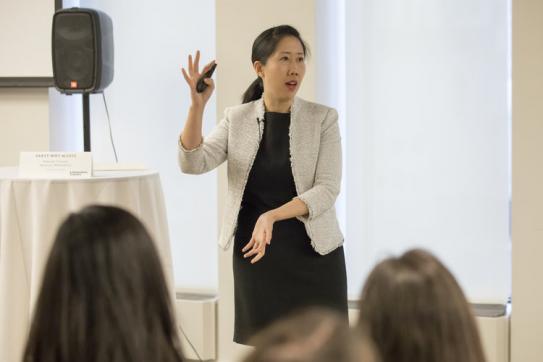As interest in venture capital steadily grows among business students, top-tier academic institutions are expanding course offerings to meet demand. At Columbia Business School, faculty have witnessed the enrollment rate for just one introductory venture capitalism course increase almost tenfold in only five years.
We recently sat down with Professor Angela W. Lee ’07, faculty director at the Eugene M. Lang Entrepreneurship Center, founder of 37 Angels, and venture partner at Fresco Capital, to discuss this growing demand, the culture of the VC industry at large, and her best advice for broadening your professional network.
CBS: Venture capitalists take on serious risk when investing in startups or founders. Do you have a list of criteria that you look at before making an investment? And if so, what is on that list?
Angela W. Lee: In general, investors look at the team, the market, and the technology. The problem will be focus points. At the investment network I run, called 37 Angels, we use a “Four P” framework to assess investments. We look at people, problem, progress, and price.
- People: Does the team have domain expertise? Do the team members have complementary skill sets? Do they have that magical “it” factor?
- Problem: Is the company going after a large market? Is the competitive landscape attractive?
- Progress: How far along are they? Do they have a repeatable customer acquisition model?
- Price: Are the deal terms fair?
CBS: How can founders refine their pitches for venture capitalists?
Lee: You have to think about what VCs care about. We like to see a company with a path to exit, and we care about rapid growth. We care that you really understand the competitive landscape.
The biggest mistake founders make is that they may shy away from what they perceive as difficult topics like entering a competitive landscape. But if you have a lot of competition, that means that a lot of people want to solve that problem, too.
I'd much rather a founder say, “Look, this is our competitive landscape. By the way, the fact that these three other companies are in it actually proves that there's a market here. But here's how we're uniquely different, or here's how they're an indirect competitor.”
CBS: What do you expect to see in 2023 regarding venture capital, fundraising, and startups?
Lee: So, quantitatively, I think that valuations are going to continue to soften. I think this will happen more dramatically in the early stage versus the later stages of investing.
There's a lot of language right now in the media about the sky falling and venture capital imploding. That's not the case. If you look at almost every graph, everything basically looks like it’s reverting back to 2019.
2020 and 2021 were anomalies. We're going back to a more normal state now.
CBS: Is there anything else we should look out for in 2023?
Lee: Yes. I think that venture capital is a very cliquey industry. Marginalized groups often don't have access to the right networks. And, unfortunately, the numbers were worse in 2022 than they were in the prior couple of years.
It's really important for founders, and especially founders who don't know a ton of startup investors, to be really thoughtful about asking for help – and making it easy for people to help. Sometimes people don't like to be very specific when they ask for help. And they'll say something like, “I want to take you to coffee” or “I want to pick your brain.”
My response is, no, be really specific. Say that you want to be introduced to this person and that person. Then, write the introductory email for that person you want help from. Don't make that person do all the work. Look up who they know on LinkedIn. Be really specific with your ask, and then make it really easy for people to respond to your ask.
CBS: Can you provide us with some updates on the VC curriculum at Columbia Business School?
Lee: The interest level in this topic is growing astronomically. Five years ago, I taught Foundations of Venture Capital to 50 students. This year, we taught 480 students the same course.
We have a number of online Executive Education courses that hundreds of people are taking each year. The appetite for this curriculum and this knowledge base is insatiable. Columbia Business School is really uniquely positioned to be the best school to go to for venture capital. We have something called the Venture Fellows Program, where you take two years of venture capital courses, you get paired with a venture capital firm, you write a thesis, and you write diligence memos.
I'm really proud of what we're doing to make Columbia Business School the place to go for higher education in the venture capital space.
